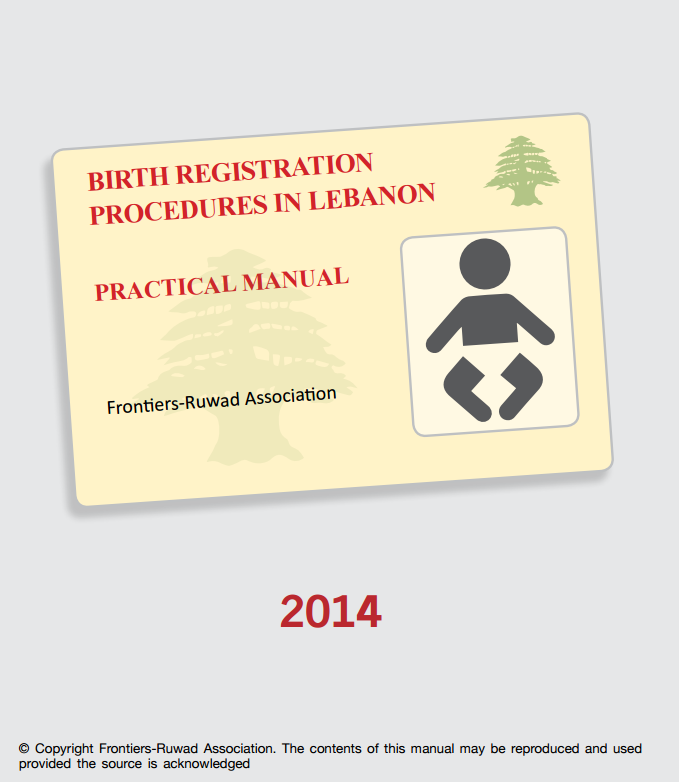Key issues in accessing civil registration
The birth registration procedure in Lebanon is complex, and therefore not all parents are registering the birth of their babies. Counselling and legal aid can help navigate some of these problems, but there are others where they cannot be used. In these cases advocacy with the relevant bodies is needed find ways to mitigate these obstacles and the consequences of non-registration. See the section on Advocacy talking points for some examples of messaging that could be used in this advocacy.
This section highlights two common issues that refugees face in accessing civil registration procedures in Lebanon and some of the mechanisms that have already been used to resolve these obstacles.
Challenge 1: Not having the required documents to register births and marriages
One of the most common challenges is that many families do not have the documents required by the registration procedures. This may be because they did not bring essential documents with them when they fled Syria, because they never possessed the documents and / or because they are not able to obtain documents in Lebanon.
Some of the mechanisms that organisations are using to navigate this problems are:
- Sharia courts in Lebanon have some discretion, particularly on what constitutes witness evidence. Mukhtars also operate with some discretion. The discretion of the Mukhtar and religious court is linked to what they believe constitutes enough evidence to prove the identity of individuals who lack official documents.
- Some Mukhtars and Sharia courts are more flexible than others as to what documents they request.
- Refugees who had been legally married in Syria but have lost their documents may nevertheless be able to be recognised as married if they bring their case to a religious court with witnesses to testify. In general, there has been increasing acceptance of witness testimonials to marriages.
Challenge 2: Limited awareness of the full process
Refugees routinely express a lack of awareness of civil registration procedures. They often do not know what to do to access these procedures and sometimes take steps that are not in line with Lebanese law and policy (for instance, it is common practice to be married by any religious Sheikh, regardless of whether the Sheikh is authorised by the relevant religious court). However, parents can generally petition for judicial “ratification” (legal recognition) of a customary religious marriage or for late registration of their marriage and so obtain a marriage certificate, which is needed to register the birth of a child.
So far, good practice has focused on producing materials explaining the civil registration system, witt the result that there are now many videos, leaflets, booklets and other information materials available. Various organisations based in Lebanon (such as UNHCR, NRC, Oxfam, Lost and Caritas) have also carried out public awareness campaigns on civil registration procedures in Lebanon, some examples of good practice in this area are given in the regional section of the toolkit. What needs to be done next is ensure that this information reaches the refugees.
Challenge 3: Keeping documents safe
There are many reasons why refugees in Lebanon are not keeping their documents safe. For instance, the Informal Tented Settlements are particularly susceptible to floods and fires, which can destroy documents. If a document is lost in an ITS, it often cannot be reported to either the Lebanese or Syrian authorities due to problems in gaining access to the relevant office and / or fear of approaching the authorities. Therefore some advice or help for refugees on preserving documents can be seen as good practice.
- When a hospital or midwife provides a birth notification to a family (whose priority is the new-born baby and not preserving this notification), it can help to ensure that the document is given in a sealed plastic envelope, which could also later be used to store other documents.
- Important documents could be photocopied or photographed in case the originals are lost.
- Information on the importance of and ways to safeguard documents should be included in public awareness sessions.
Challenge 4: Not adhering to the statutory deadline for birth registration (1 year)
Article 12 of Lebanon’s Law on Documenting Personal Status states: “If a year passes from the date of birth, the registration would only be possible through a court ruling issued in the deliberations chamber and based on a request from the Public Prosecution or the concerned party.”
It is important to try and get babies registered before this deadline. When the one year deadline is not met, the family must go through a court proceeding to register the birth. It is not necessary to hire a lawyer to do this, but as it is a complicated
It is clear from this diagram how complicated the procedures is. If families are aware of this before the child is born they are more likely to try and avoid it by registering births before the deadline.process, legal aid or counselling is encouraged. Frontiers Ruwad have developed a diagram to show the stages of this procedure:
Good practice therefore includes raising awareness about the procedures, identifying and supporting families in registering births before the deadlines and referral to organisations who work on legal aid and counselling of families who have not registered births by the deadline.
NRC’s ICLA programme in Lebanon introduced a scheme which provides additional paralegal assistance or legal representation to parents of unregistered children aged 9 months or older in order to register before the deadline. At the same time, ICLA is training humanitarian partners and local communities on identification and referral, which includes sensitisation to deadlines in the birth registration procedure.
Further reading
On birth registration procedures in Lebanon, obstacles to registration and potential solutions to these problems:
NRC-ICLA Update on birth registration for refugees from Syria (January 2015)
Frontiers Ruwad, Birth Registration in Lebanon – A practical manual





